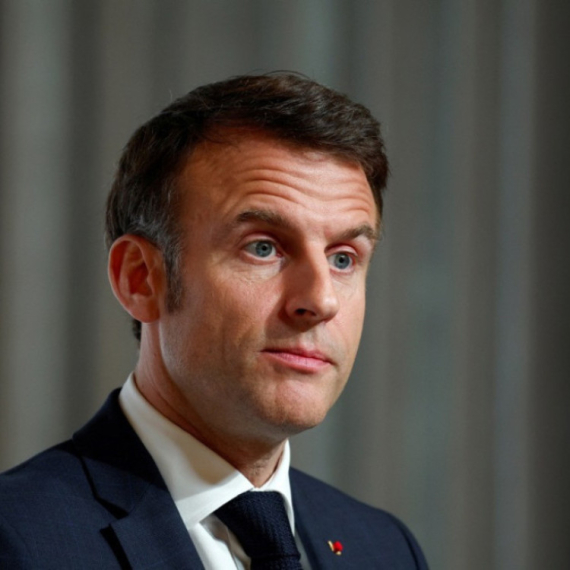Jeremić takes ICJ issue to Athens
Foreign Affairs Minister Vuk Jeremić met today with his Greek counterpart Dora Bakoyannis and other officials.
Thursday, 11.09.2008.
08:29

Foreign Affairs Minister Vuk Jeremic met today with his Greek counterpart Dora Bakoyannis and other officials. Speaking in Athens after the meeting, Bakoyannis said that when it came to Kosovo's status it is of essential importance to improve the lives of all the people that live there, especially the minorities, and that the presence of the EU mission will help achieve security and stability, without prejudicing the status. Jeremic takes ICJ issue to Athens An AP report earlier in the day said the Greek foreign minister repeated that her country would not recognize Kosovo Albanians' unilateral declaration of independence. Jeremic said that he told Bakoyannis of Serbia’s initiative before the UN General Assembly to ask the International Court of Justice, ICJ, for its opinion on Kosovo’s proclamation, adding that it is the strategic priority of Serbia to increase the speed of integrating the entire Western Balkans into the European Union. Yesterday, Jeremic addressed a session of the Permanent Council of the OSCE in Vienna and stated that Serbia wants to defend its her interest and will ask for the iCJ opinion. Belgrade will continue with its agile approach as before, he said. "and will not stop until the UN General Assembly session, or afterwards". “We did not take up arms. In other parts of the world people are taking up arms, using force and economic sanctions. Serbia showed that it is a true peacemaker in the region and that gives us the moral right to defend our national interests through international law and institutions,” the foreign minister said. Jeremic added that predictions about the consequences of Kosovo’s unilateral declaration of the independence, about which he had warned previously, were now coming to pass, but that it was still not too late to prevent matters from spinning out of control. "When we last met (Feb.19), I spoke of the precedent that could arise from the abject failure of the Kosovo Albanians to embrace the 21st century principles of Europe—namely compromise, concession, and consensus-building," hetold the OSCE Permanent Council. "I shared my fear with you that the unilateral imposition of outcomes to ethnic conflicts could create very troubling consequences to the community of democracies that is the OSCE, or even beyond. I spoke of what the fanning of secessionist flames could produce, and I expressed deep concern about what could result from the attempt to forcibly partition a sovereign, democratic state like Serbia," Jeremic pointed out. He underlined: "It gives me no pleasure to note that some of what I had then laid before you as the likely consequences of the Kosovo UDI, has come to pass." "The fabric of security and cooperation in Europe has been damaged. The dominoes are starting to fall, but there is still time to prevent the worst of these from spinning beyond our control." The minister explained that a part of Serbia's "diplomatic approach to securing peace and stability in the Western Balkans centers on an initiative we have put before the next General Assembly of the United Nations." "Serbia has submitted a draft resolution to be considered at the forthcoming 63rd Session. This document refrains from taking political positions on Kosovo's UDI. Rather, in simple and direct language, it asks the principal judicial organ of the United Nations—the International Court of Justice (ICJ)—to render an advisory opinion on the following question: Is the unilateral declaration of independence by the Provisional Institutions of Self-Government of Kosovo in accordance with international Law?" he stated, noting that "numerous benefits would result from referring this matter to the ICJ." According to Jeremic "on the regional front, we believe that a number of relationships could begin to be restored to health". "From the perspective of the international system, sending the Kosovo question to the ICJ would prevent it from serving as a deeply problematic issue in any part of the globe where secessionist ambitions are harbored. It would provide politically neutral, yet judicially authoritative guidance to many countries still deliberating on how to approach the Kosovo UDI in line with international law." The minister spoke about the most important reason "why it is proper for the General Assembly to support Serbia's request to obtain an advisory opinion from the ICJ. It has to do with the vital international principle at stake: the right of any member State of the United Nations to pose a simple, elementary question—on a matter it considers vitally important—to the competent court. To vote against this resolution is in effect to vote to deny the right of any country to seek judicial recourse through the UN system." Jeremic, Bakoyannis in Athens on Thursday (Beta)
Jeremić takes ICJ issue to Athens
An AP report earlier in the day said the Greek foreign minister repeated that her country would not recognize Kosovo Albanians' unilateral declaration of independence.Jeremić said that he told Bakoyannis of Serbia’s initiative before the UN General Assembly to ask the International Court of Justice, ICJ, for its opinion on Kosovo’s proclamation, adding that it is the strategic priority of Serbia to increase the speed of integrating the entire Western Balkans into the European Union.
Yesterday, Jeremić addressed a session of the Permanent Council of the OSCE in Vienna and stated that Serbia wants to defend its her interest and will ask for the iCJ opinion.
Belgrade will continue with its agile approach as before, he said. "and will not stop until the UN General Assembly session, or afterwards".
“We did not take up arms. In other parts of the world people are taking up arms, using force and economic sanctions. Serbia showed that it is a true peacemaker in the region and that gives us the moral right to defend our national interests through international law and institutions,” the foreign minister said.
Jeremić added that predictions about the consequences of Kosovo’s unilateral declaration of the independence, about which he had warned previously, were now coming to pass, but that it was still not too late to prevent matters from spinning out of control.
"When we last met (Feb.19), I spoke of the precedent that could arise from the abject failure of the Kosovo Albanians to embrace the 21st century principles of Europe—namely compromise, concession, and consensus-building," hetold the OSCE Permanent Council.
"I shared my fear with you that the unilateral imposition of outcomes to ethnic conflicts could create very troubling consequences to the community of democracies that is the OSCE, or even beyond. I spoke of what the fanning of secessionist flames could produce, and I expressed deep concern about what could result from the attempt to forcibly partition a sovereign, democratic state like Serbia," Jeremić pointed out.
He underlined: "It gives me no pleasure to note that some of what I had then laid before you as the likely consequences of the Kosovo UDI, has come to pass."
"The fabric of security and cooperation in Europe has been damaged. The dominoes are starting to fall, but there is still time to prevent the worst of these from spinning beyond our control."
The minister explained that a part of Serbia's "diplomatic approach to securing peace and stability in the Western Balkans centers on an initiative we have put before the next General Assembly of the United Nations."
"Serbia has submitted a draft resolution to be considered at the forthcoming 63rd Session. This document refrains from taking political positions on Kosovo's UDI. Rather, in simple and direct language, it asks the principal judicial organ of the United Nations—the International Court of Justice (ICJ)—to render an advisory opinion on the following question: Is the unilateral declaration of independence by the Provisional Institutions of Self-Government of Kosovo in accordance with international Law?" he stated, noting that "numerous benefits would result from referring this matter to the ICJ."
According to Jeremić "on the regional front, we believe that a number of relationships could begin to be restored to health".
"From the perspective of the international system, sending the Kosovo question to the ICJ would prevent it from serving as a deeply problematic issue in any part of the globe where secessionist ambitions are harbored. It would provide politically neutral, yet judicially authoritative guidance to many countries still deliberating on how to approach the Kosovo UDI in line with international law."
The minister spoke about the most important reason "why it is proper for the General Assembly to support Serbia's request to obtain an advisory opinion from the ICJ. It has to do with the vital international principle at stake: the right of any member State of the United Nations to pose a simple, elementary question—on a matter it considers vitally important—to the competent court. To vote against this resolution is in effect to vote to deny the right of any country to seek judicial recourse through the UN system."


























































Komentari 20
Pogledaj komentare